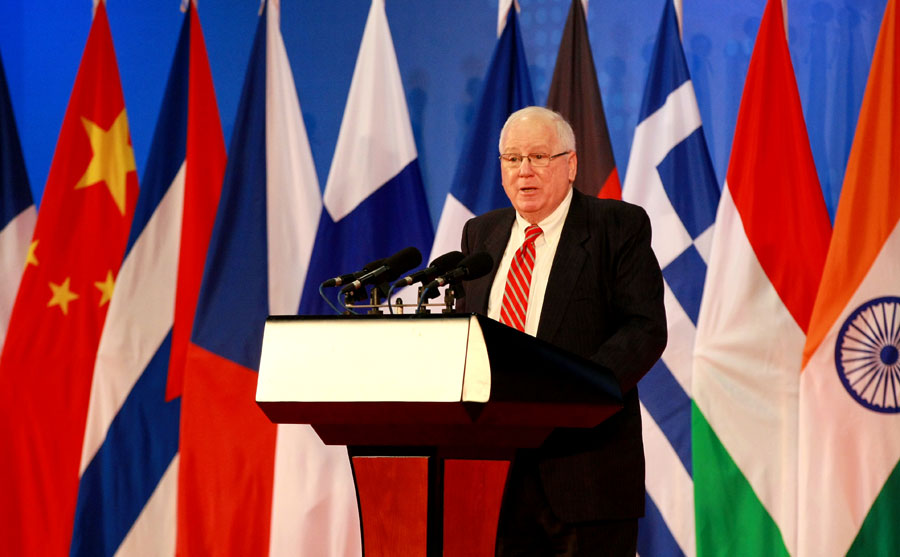
1942 in New York City
EDUCATION:
BA, political science, Loras College, Iowa
MA, political science, Marquette University, Wisconsin
PhD, international relations, University of Maryland
CAREER:
1967-99: Diplomat, US State Department
1996-99: US ambassador to Cambodia
2000-present: President, World Food Prize Foundation
HONORS:
2014: Iowa Medal
The Iowa diplomat with 'two interesting stories'

Kenneth M. Quinn has many memories from his career as a US diplomat, but two in particular stand out: The time he met Xi Zhongxun, the governor of Guangdong province, in 1980, and decades later when he met his son, President Xi Jinping.
The encounters were so special that Quinn commissioned a painting to remember them, titled Two Interesting Stories. Today, copies of the art work hang in the Iowa Gallery's Hall of Laureates and the United States embassy in Beijing.
Quinn, now 76 and president of the foundation behind the World Food Prize, often referred to as the Nobel Prize in food and agriculture, has seen firsthand the transformation China has undergone in the past four decades.
In 1977, while working for the US State Department, Quinn was assigned to the office of Robert Ray, then governor of Iowa. Two years later, he accompanied Ray on a trip to China as part of a delegation of US governors, which came a few months after Deng Xiaoping's historic trip the other way.
To reciprocate, a delegation of Chinese governors traveled to Iowa in 1980, led by Xi Zhongxun, who in addition to his role in Guangdong was also vice-chairman of the Standing Committee of the National People's Congress, the country's top legislature.
Quinn had not had the chance to meet Xi Zhongxun during the visit to southern China, but he had the "great honor" of greeting the Chinese governors when they arrived at the airport in Des Moines, the state capital.
The three-day visit featured a packed schedule, and Quinn accompanied the delegation to see Iowa's agricultural infrastructure, including family farms, agribusiness companies and innovative research projects at Iowa State University.
During a stop at the Amana Colonies, a collection of settlements founded in 1854 to house about 800 immigrants from Germany, the governors learned that the original residents jointly owned all the land and the food it produced.
"I distinctly recall that Governor Xi seemed riveted as he and the other delegates heard how the decision had been taken in the 1930s to divide up the Amana commune into individual farms, with each family controlling its own parcel of land and keeping all of the crops they produced," Quinn wrote in a Des Moines Register article last year.
Though the economic production structure at Amana has changed, the political culture and sense of community has been retained, he said, adding that the delegates asked more questions at Amana than at any other stop.
China has lifted at least 700 million people out of poverty over the past four decades, and has significantly improved the lives of millions more.
For Quinn, a key ingredient has been the transformation of the country's agricultural sector, which he said reflected what the Guangdong governor saw on that trip to Iowa.
"What is most intriguing about Xi Zhongxun's visit to Iowa is its connection to the vision he developed for the reform of Chinese agriculture and its subsequent dramatic and explosive growth," Quinn wrote in an article for Iowa History Journal in October.
In actual fact, China's rural land reform had started in Xiaogang village, Anhui province, when 18 villagers in 1978 signed a secret pact to divide communally owned farmland into family plots, which allowed them to retain the produce left over after giving a percentage of their harvest to the government. The system was rolled out nationwide in 1984.
Quinn later learned from Chinese friends that in 1985, when Xi Jinping, then a county official in Hebei province, was preparing for a fact-finding trip with colleagues to the US, he had consulted his father, who suggested they visit Iowa to see its agricultural development. The delegation followed that advice.


